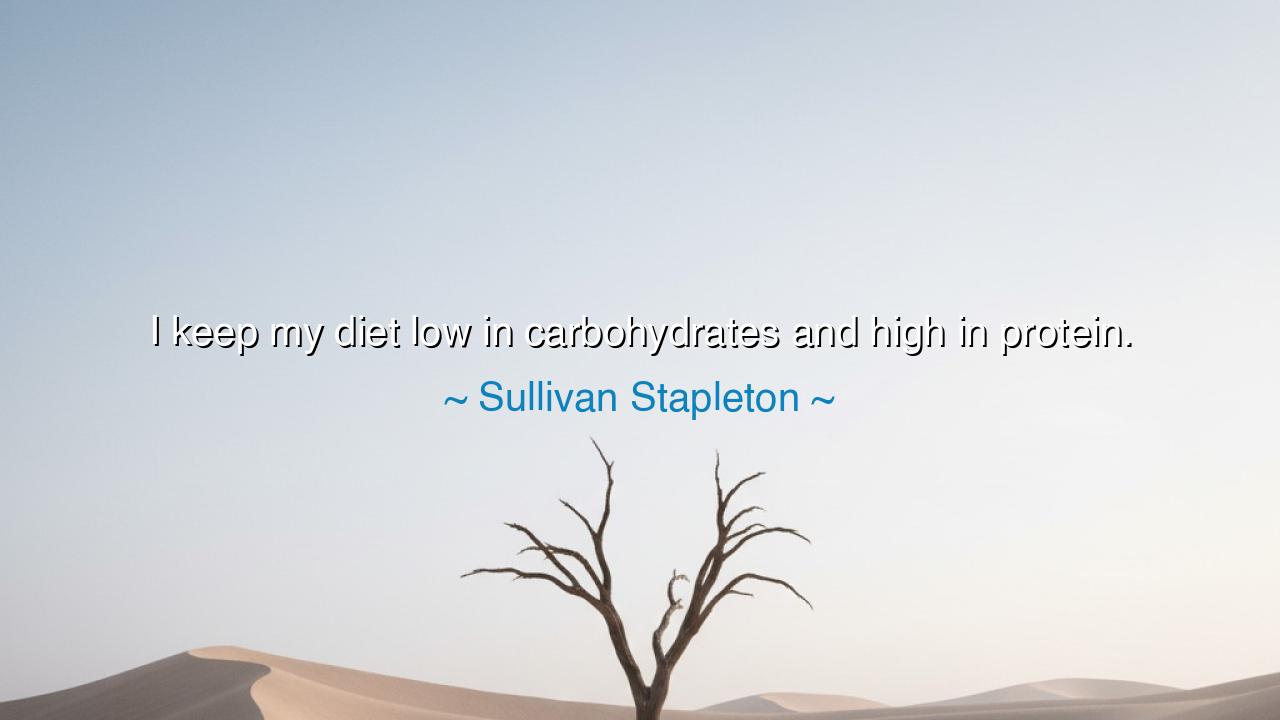
I keep my diet low in carbohydrates and high in protein.






"I keep my diet low in carbohydrates and high in protein." These words, spoken by Sullivan Stapleton, are a reflection of the timeless wisdom of discipline, balance, and the ancient pursuit of health and vitality. His choice to focus on protein while limiting carbohydrates speaks not only to the mechanics of diet, but to a deeper understanding of what it means to nourish the body in a way that supports strength, endurance, and clarity. This simple yet profound decision mirrors the practices of the ancients who, long before the rise of modern nutritional science, understood that the right balance of nutrients could shape not just the body but the mind and spirit.
In the ancient world, balance in diet was seen as essential to achieving both physical strength and mental clarity. Hippocrates, the great physician of ancient Greece, famously stated, "Let food be thy medicine, and let medicine be thy food." He knew that food was not merely a source of fuel, but a vital element in maintaining health, and that different types of food had different effects on the body. By focusing on protein, as Stapleton does, Hippocrates would have recognized a commitment to strength and vitality. The ancient Greeks, renowned for their athletic prowess, understood that the body thrives on nourishing foods that promote muscle growth and endurance, just as Stapleton’s choice of a high-protein diet suggests the same focus on physical power and longevity.
Consider the example of the Spartans, those legendary warriors whose discipline and physical conditioning were as much a part of their greatness as their prowess in battle. Their regimen was not merely about training the body but about fueling it in a way that maximized their strength and endurance. Their diet was simple, yet focused on the nourishment needed to support their intense physical activities. Just as Sullivan Stapleton limits his carbohydrates to fuel a leaner, more efficient body, the Spartans understood that to build the body into an instrument of power, it needed to be nourished with the right balance of nutrients—lean meats, vegetables, and other protein-rich foods. Their strict diet was a tool for building strength and sustaining them in battle, a reminder that food must be viewed not as indulgence but as fuel for the body’s ultimate potential.
Similarly, Roman soldiers were known for their discipline in both physical conditioning and dietary habits. The Romans, while enjoying lavish feasts, also understood the importance of moderation and functional nourishment. Their meals were designed not just for pleasure, but to maintain the strength and vitality required for long marches and brutal campaigns. The Roman emphasis on protein-rich foods, such as meats and legumes, was meant to sustain their soldiers, providing them with the muscle and energy needed for victory. Stapleton’s focus on high-protein, low-carb eating aligns with this ancient approach—choosing foods that provide long-lasting energy and support the body’s endurance rather than foods that create temporary satisfaction but fail to nourish the body for the long term.
The deeper lesson in Stapleton’s words, however, is one of self-discipline and purpose. The act of choosing a protein-rich diet over foods laden with carbohydrates speaks to a conscious decision to fuel the body in a way that serves one’s goals—whether for health, fitness, or overall well-being. In the ancient world, self-discipline was revered as a key virtue, seen not just in physical training but in every aspect of life. Aristotle, in his writings on virtue, taught that true strength came from the ability to master one's desires and habits. Just as the Spartan warriors disciplined their bodies through diet and exercise, so too must we train ourselves to choose what best nourishes us—whether in our physical diets, our thoughts, or our actions.
In practical terms, Stapleton’s decision to limit carbohydrates and emphasize protein reflects a commitment to balance—a balance between pleasure and purpose, between indulgence and discipline. The lesson is clear: we must choose our nourishment carefully, understanding that what we consume will directly affect how we perform in the world, how we feel, and how we interact with others. Whether we seek to build muscle, increase energy, or simply maintain health, the choices we make about what we eat must support our goals and values, rather than being driven by momentary cravings or societal expectations.
Thus, the wisdom in Stapleton’s words extends far beyond diet; it teaches us about the power of purposeful living. By adopting a diet that supports our physical goals, we take responsibility for our well-being and begin to align our actions with the vision of the person we wish to become. Just as the ancients embraced the principles of balance, self-control, and awareness, so too must we cultivate the discipline to make wise choices about what we consume. Whether in food, thoughts, or actions, the path to strength and clarity is not one of excess, but of purposeful nourishment and careful attention to the needs of our bodies and minds.
In conclusion, let Sullivan Stapleton’s commitment to a protein-focused, low-carb diet remind us of the ancient wisdom that health and strength require discipline and balance. Let us embrace the idea that true nourishment comes not from indulgence or excess, but from the careful, deliberate choices we make to support our long-term vitality and well-being. Like the warriors and philosophers of old, let us live with purpose, carefully considering what we allow into our bodies, and using that nourishment to build lives of strength, endurance, and clarity.






AAdministratorAdministrator
Welcome, honored guests. Please leave a comment, we will respond soon